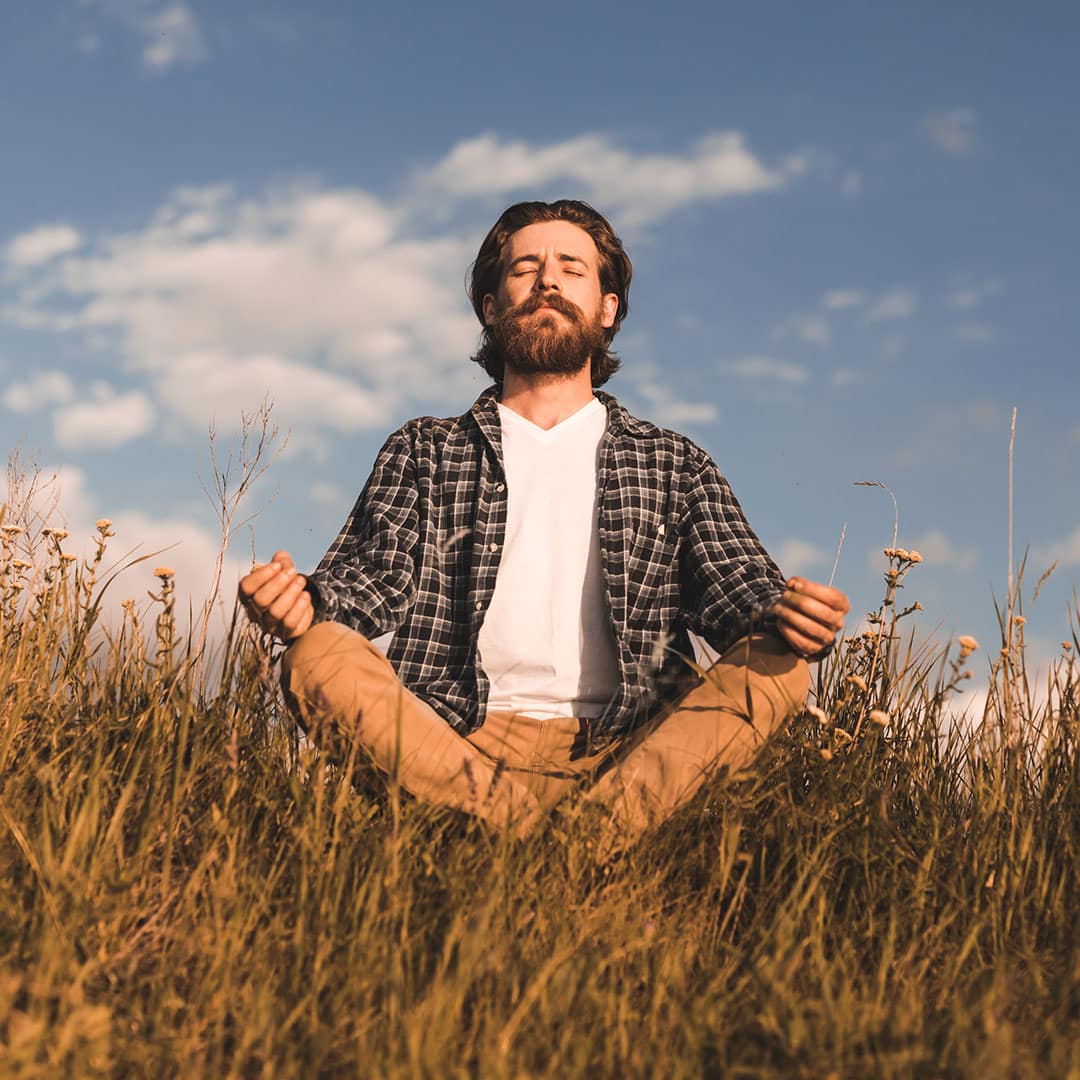Are you feeling out of touch with yourself and your life? Are you just going through the motions, feeling numb? Maybe you’ve tried therapy, but you still experience a general malaise and wonder if you’ll just have to resign yourself to being unhappy much of the time.
This is a very real issue for many men. Nearly 1 in 10 men experience anxiety or depression on a daily basis, but less than half of those men will ever seek treatment. Men also experience the added social stigma around discussing their mental health and their most intimate feelings.
No doubt you’ve heard of the concept of mindfulness, but do you know what it can actually do to revitalize your sense of well-being?
Read our mindfulness guide to discover how to more deeply access your senses and feelings to reduce stress and create a more grounded, satisfying and joyful life right in this moment. Mindfulness is a gift that’s waiting for you whenever you feel inspired to engage with it.
What is Mindfulness Meditation?
Mindfulness has its roots in Buddhist meditation, and meditation is a collection of practices that are used to expand awareness by concentrating on specific aspects of the mind and body.
There are many ways to define meditation, but an easy way to understand it is to think about training your attention to reach a mental state of calm concentration and positive emotions. Mindfulness is one of the most popular meditation techniques, which has two parts: attention and acceptance.
Attention. Paying attention is about attending to your experiences and focusing on what’s happening right now in the present moment. You direct your awareness to your breath, your thoughts, the physical sensations in your body and the feelings you’re experiencing.
Acceptance. Acceptance involves observing those feelings and sensations without judgment. Instead of responding or reacting to the thoughts or feelings, you just note them and let them go
Science Confirms the Positive Impact of Mindfulness
Here’s the exciting part: researchers reviewed more than 200 studies of mindfulness among healthy people and discovered that mindfulness-based therapy was especially effective for reducing stress, anxiety and depression.
But how can simply paying attention to your thoughts and feelings help your body and mind so much? Researchers believe the benefits of mindfulness are related to its ability to dial down the body’s stress response. Chronic stress impairs our immune system and worsens other health problems. Mindfulness may cause a cascade of positive effects throughout the body by lowering the stress response.
How To Practice Mindfulness
The good news is that there’s no set way to practice mindfulness. It can involve a sitting meditation where you’re in a quiet space and focus on your breathing and sensations in your body. When your mind wanders and your to-do list moves front and center, you can gently return to the present moment.
If you’re more active, you’ll be happy to know that you don’t just have to sit in silence to practice mindfulness! You can also integrate the practice into your everyday life during routine tasks and even pastimes and sports.
Simple Mindfulness Practices for Everyday Life
Get curious and try some of these ideas one or more times a day. Don’t be afraid to mix them up, add new ones or nix the ones that just aren’t a fit for you.
- Take some deep breaths. Breathe in through your nose to a count of four, hold for one second and then exhale through the mouth to a count of five. Repeat often. This is one of many breathing techniques, so find the one that works for you.
- Mindfulness during your daily routines. You can practice mindfulness while brushing your teeth, drinking your coffee in the morning, driving and doing household chores like chopping vegetables and washing dishes. Pay attention to and relax into what you’re doing and feeling in that moment.
- Mindful eating. Harvard’s T.H. Chan School of Public Health website notes that “mindful eating focuses on your eating experiences, body-related sensations and thoughts and feelings about food, with heightened awareness and without judgment.” Be aware of and slowly savor the taste, textures and flavors in each bite. Listen to when your body is hungry and full.
- Do a body scan. Sit or lie down in a quiet spot and slowly focus your attention on how each part of your body is feeling as you scan from your head to your toes. This soothing practice can really help you connect with your body to feel deep peace and relaxation.
- Be mindful for three minutes. You don’t have to set aside hours for meditation to feel the benefits. Try this three-minute mindfulness exercise of breathing and grounding to refresh yourself any time of day.
- Practice yoga. While it’s great for your body, it turns out that yoga can increase mindfulness in other areas of your life as well.
- Take a walk or a hike. Stepping outside is a fantastic way to practice mindfulness. A variation on this is to do a sensory walk — even if you’re in an urban setting. Pay attention to your five senses as you walk, noticing the sounds, sights, temperature, smells, tastes, textures and walking surfaces around you.
The Benefits of Nature in Mindfulness
Being outdoors gives your mind and body a dazzling array of benefits. In her book, The Nature Fix, journalist Florence Williams notes these research findings on how profoundly nature benefits us:
- After five minutes in a forest surrounded by trees, the heart rate slows, facial muscles relax and the prefrontal cortex quiets.
- Being around water and birdsong improves mood and alertness.
- Spending time in natural landscapes increases alpha waves in the brain, which are associated with calm and alertness.
- Spending an hour and a half in nature reduces rumination and helps us to be less preoccupied with problems.
- Spending two hours (120 minutes) per week in nature can make us happier and boost overall health and well-being.
Williams found that current neuroscience studies offer researchers ways to quantify how things like being in quiet green spaces, viewing natural landscapes and even the smell of trees can affect our brains and improve cognitive performance.
In 1982, the Japanese Ministry of Agriculture, Forestry and Fisheries created the term shinrin-yoku which translates to forest bathing or absorbing the forest atmosphere. In forest bathing (no actual bathing is involved), participants simply breathe and relax while walking or sitting to calmly experience their surroundings using all their senses. The practice lowers blood pressure, heart rate and levels of harmful hormones like cortisol, the hormone your body produces when it’s under stress. Letting your mind and senses explore, experience and enjoy the moment in the outdoors is the key to this practice.
The National Library of Medicine states that part of the immune-boosting experience of forest bathing involves breathing in phytoncides (wood essential oils) which are antimicrobial volatile organic compounds derived from trees, an experience similar to aroma therapy.
9 Exhilarating Ways to Experience Mindfulness Outdoors in Denver
Now that you see exactly why being outside is so great for you, here are some ideas for diving into some fresh-air opportunities right in your own backyard.
- Yoga on the Rocks. Experience body-soothing yoga on the red rock steps of the breathtaking and historic Red Rocks Amphitheater, nestled in Morrison, Colorado. Sign up for classes at 7 a.m. Saturday and Sunday mornings, June 5- August 1, 2023.
- Visit a park. Denver has a wealth of state parks, open spaces and national park gems nearby. Roxborough, Chatfield, Cherry Creek, Castlewood, and El Dorado Canyon are just a few of the wonderful metro-area parks in which to forest bathe, walk, climb, ride your bike or bask in nature to your heart’s content. You’ve also got access to miles of beautiful front-range countryside in Jefferson County Open Space Parks and Trails, Douglas County Open Space Properties and Trails and The Bluffs Regional Park and Trail. If you want to experience nature’s grandeur on a larger scale, check out Colorado’s four national parks.
- Road and mountain biking. Melissa Balmer, founder of PedalLove.org says that since you remain focused on the present moment for long periods, “cycling certainly can be a good way to build mindfulness.” Check out these Denver-area road and mountain biking trails.
- Birdwatching. Birding itself is an act of mindfulness. In a 2017 study, scientists from England’s University of Exeter proved that when people witnessed more birds in their daily lives, they experienced a reduction in depression, stress and anxiety. Head to Washington Park, Cherry Creek State Park or Rocky Mountain Arsenal National Wildlife Refuge, where you’ll be able to spot myriad birds, including pelicans, snowy egrets, an assortment of ducks, night herons and even bald eagles.
- Gardening. A garden filled with buzzing insects, fragrant flowers and bold colors is the perfect place to slow down, relax and focus on what you’re experiencing at the moment. Plant your own flower or vegetable garden, or just fill some pots with your favorite seasonal herbs and plants so you can spend mindful time tending outside. If you don’t have space for your own garden, consider joining a community garden group through Denver Urban Gardens.
- Visit local urban gardens. If you’d rather just enjoy the lush results of expert green thumbs, leisurely stroll through Denver Botanic Gardens, where you can also sign up for monthly guided meditations. Check out Hudson Gardens, where you’ll get free admission to acres of verdant gardens, open spaces and trails, a turtle and a water lily pond, a self-guided artwork tour, guided bird walks and an apiary with 20 beehives.
- Fly Fishing. Vermont’s Brattleboro Retreat’s Uniformed Services Program, a specialized treatment and training program for first responders and veterans moving through service-related trauma, includes a therapeutic fly fishing and mindfulness practice in its program. If you already love fly fishing, it’ll be a boost for your mindfulness practice. If you’re new to the sport and want to try this angle (pun intended) for your mindfulness practice, Orvis offers free fly fishing classes. Fishing the Good Fight is another program that offers retreats and resources that combine fly fishing and mental wellness.
- Try an InspiraHike. The founders of this Denver company have created several front-range hikes that are coupled with choreographed music (heard through state-of-the-art headphones) and guided inspirational commentary to match the landscape, pace and mood of the particular journey. Everything that happens is live and is facilitated by a hike leader. The group hears everything in unison to create a transformational experience, alone with your thoughts but participating in a larger community of hikers.
- Act like a kid (or take your favorite kid with you).
- Find your favorite park and set up a hammock. Then watch the clouds roll by, listen to the birds chirp and feel the warm sunshine on your body.
- Spread out a blanket and read under your favorite tree.
- Play with bubbles and a wand.
- Draw with sidewalk chalk.
- Walk barefoot.
- Sit on a rock.
There are no hard and fast rules when it comes to experiencing mindfulness, but there are numerous benefits to your physical and mental health. So, whichever method you choose, get started now to give your psyche a boost.














